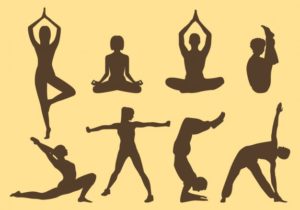
Is Yoga Compatible With Evangelical Faith?
In these notes we are not asking if those who practice Yoga are nice people. Nor are we asking if they are genuine, nor even if Yoga works. We are asking,what are the roots of Yoga and are they compatible with evangelical Christianity?
There are many varieties of Yoga, which date back to the origin of the practice hundreds of years ago. However, much of what we experience in Britain has been ‘westernised’ or ‘Christianised’ to make it more palatable. What we see and experience today are the ‘branches’ but surely they cannot be removed from the roots? The power of Yoga comes from its roots and just what are they?
What are the Roots of Yoga?
Yoga is the path to enlightenment in Hinduism. Yoga is derived from the Sanskrit word yuj meaning ‘to unite’, and therefore it means “union with God.” The meaning of the word shows the goal of Yoga and this is borne out in several ways.
Swami Vishnidevanda, an expert in Yoga and author of the book ‘The Complete Illustrated Book of Yoga’ is quoted as saying:
‘The aim of all Yoga practice is to achieve truth wherein the individual soul identifies with the supreme soul of God’
Other definitions include:
Yoga is the means by which finite man seeks union with the Infinite Being’ – that is, God.
‘Unon – science of uniting the individual soul with the Cosmic Spirit’ (Autobiography of a Yogi, Paramahansa Yogananda
There are four main types of Yoga, four different main pathways to the same goal.
Bhakti Yoga – the way of devotion. First, this will include seeking to detach yourself from material things that are only illusion (Maya). Second, you must positively devote yourself to a guru or godman being the personal form of the impersonal god.
Karma Yoga – the way of service. This will include pilgrimages, good works etc. The karma yogi will go about his everyday life with no aim or expectation of self-gratification. In this detached state his actions are no longer his own and therefore karma – the result of ones own actions – no longer affects him.
Jnana Yoga – the way of knowledge. This leads the yogi into a life of concentration and learning of the Hindu scriptures.
Raja Yoga – the way of contemplation. This is called the royal way and is the way of deep meditation.
Some also teach that there are eight stages in the path to enlightenment.
l. Body purification
2. Postures
3. Postures to produce psychic energy
4. Breath control
5. Stilling the mind
6. Concentration
7. Meditation
8. Union with God (shiva)
The main form of Yoga in the west is Hatha Yoga, a division of Raja Yoga. But is Hatha Yoga just about keep fit exercises, breathing etc?
Having laid this foundation let us make a few clear statements and check for their compatibility with Scripture.
Yoga Brings us Into Union With an Impersonal force – God?
The god of Hinduism by definition is an impersonal force and so immediately we are at odds with the personal Creator God that evangelical Christians see within the Bible.
Most Yogis will not throw the Bible away completely but will redefine it.
Today we hear phrases such as the source within or the ki that leads us back to our impersonal force god. Ki in Taoism is the combination of good/evil, light/dark, etc. and as this concept clearly runs throughout all Yoga, it is incompatible with evangelical Christianity.
Yoga Works on the Basis That Man is Basically Good
Tony Quinn, who is supposed to have introduced Yoga to Ireland, speaks of the inner core that is perfect. This inner power, which is latent, we are seeking to release. But what does the Bible say about the inner core of man?
You only have to read verses such as Romans 3:10 and 23 or 7:18, to see that again Yoga is incompatible with evangelical Christianity.
Yoga is the Way to Come to Oneness With God – Salvation?
Despite many attempts to show otherwise, nowhere in the Bible do we find Yoga mentioned as a means of Salvation or of coming to know God. What then of those who have had supernatural experiences have they not met with ‘god’?
There are two supernatural forces, one being the counterfeit, and we need to check carefully to see where the power we experience comes from. Would God give power to something that is clearly against the teaching He has given? We must answer this logically and not emotionally.
Words such as ‘praying’ may be used in a Yoga class, but what does that mean? Are you really praying to God? Look at John 14:6, 3:16 and 2 Corinthians 11:3-4, 13-15 among many other verses to see that on this point Yoga again is incompatible with evangelical Christianity.
Yoga is all About Self-Realisation
The aim of Yoga is to bring the inner ‘self’ to the front, to make it stronger and exert itself. However the Biblical picture is the opposite. Many who have been involved with Yoga in the past testify to this area of self as very strong.
Matthew 16:24-26 and Galatians 2:20 show Yoga as again being incompatible with evangelical Christianity because of its emphasis on self.
Yoga Encourages Worship of the Guru -god-man
In some forms of Yoga today this is still clear. The one man is above all the rest, he has finished his cycle of reincarnations and is now ‘god’. Many Gurus claim to be god and many followers are seeking to be like god. They want to release the power within that will give them control over their life.
We may feel that we are able to end up with some control over our lives now but we have no control over our future life. Are there really many gods and can we be in control of our own destiny?
Evangelical Christians see within the Bible that there is One God and we can never be gods. The One personal creator God of Scripture, alone has the power to decide on life and death issues, see Hebrews 9:27 and Matthew 10:28
Conclusion
The conclusion that we must come to is overwhelmingly that Yoga and evangelical Christianity are incompatible. At very best in Yoga you are basing your hope on man’s ideas that can never deliver in fullness what is promised. At worse you have tapped into a power that is not from the one true God as described above.

